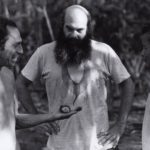New Life For The Beneficial Plant Research Association

Dr. Andrew Weil has joined with a group of botanists, Indigenous healers, physicians, anthropologists, business and marketing experts, and plant lovers to reinstitute the Beneficial Plant Research Association (BPRA). The team will identify and investigate promising plants using academic and laboratory research, field studies, and hands-on garden testing.
Dr. Weil originally founded the BPRA in 1979 along with his fellow Harvard graduate ethnobotanist Dr. Tim Plowman and horticultural and biological researcher Margaret “Honey” Williams. The group’s mission was to investigate plants for their potential as food and medicine, and they identified several candidates: sangre de grado (Croton spp.), brunfelsia (Brunfelsia spp.), yoco (Paullinia yoco), Amazonian chili (Ají Yuquitania), and coca (Erythroxylum coca and E. novogranatense).
The coca plant, which has been used by indigenous peoples of the Amazon and the Andes for thousands of years, was of particular interest to the BPRA. Dr. Weil and colleagues published several journal articles in the late 1970s and early 1980s on the potential benefits of coca for motion sickness, depression, gastro-intestinal disorders, and diabetes, among other ailments. When chewed as whole leaves, coca is neither toxic nor habit-forming. It is a mild stimulant, without the irritating effects of coffee or other caffeine-based preparations.
The problem was, and is, that in addition to its many beneficial properties, the coca plant contains a small amount of cocaine. The association of coca with cocaine made any research into its benefits suspect during the Reagan-era “war on drugs” and it greatly limited the ability of the BPRA — or any researchers — to explore the plant’s therapeutic potential.
In 2024, Dr. Weil re-established the BPRA along with fellow Harvard graduates Wade Davis and Michael Balick. As president of the BPRA, Dr. Weil is now directing an expert team of doctors, researchers, and business experts to continue the important research he began nearly 50 years ago.
“I’m excited to be picking up this work again,” says Dr. Weil. “Coca has so many potential benefits that have not been fully explored yet, and now we have a team of researchers looking into it. We also have a new initiative specifically investigating whole plants for women’s health.”
Time is of the essence, adds Dr. Weil. “There are so many plants that we know, or suspect have medicinal value that are being threatened with extinction right now. We lose at least one medicinal plant every two years, and any one of them may have had potential to be a major medicinal discovery. Given the ongoing loss of habitat for many of these plants, there is a new urgency to investigating, testing, and saving them. That’s why we brought back the BPRA – to ensure ongoing efforts to identify and preserve plants that have potential to do so much good for us.”
Find out more about the BPRA and Dr. Andrew Weil’s role in it.
Sources
Biondich AS, Joslin JD. “Coca: The History and Medical Significance of an Ancient Andean Tradition.” Emerg Med Int. 2016;2016:4048764. doi: 10.1155/2016/4048764. Epub 2016 Apr 7. PMID: 27144028; PMCID: PMC4838786. pmc.ncbi.nlm.nih/articles/PMC4838786/
Weil AT. “The therapeutic value of coca in contemporary medicine.” J Ethnopharmacol. 1981 Mar-May;3(2-3):367-76. doi: 10.1016/0378-8741(81)90064-7. PMID: 6113306. pubmed.ncbi.nlm.nih/6113306/










